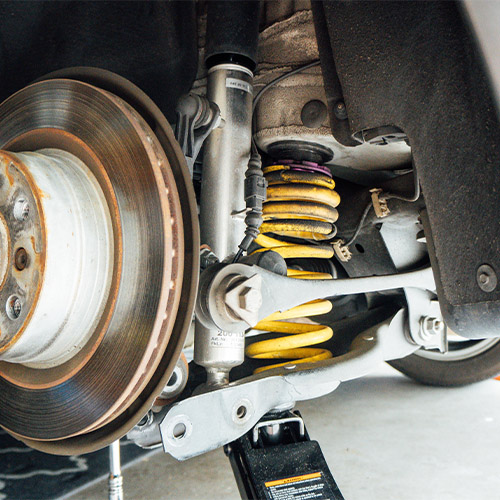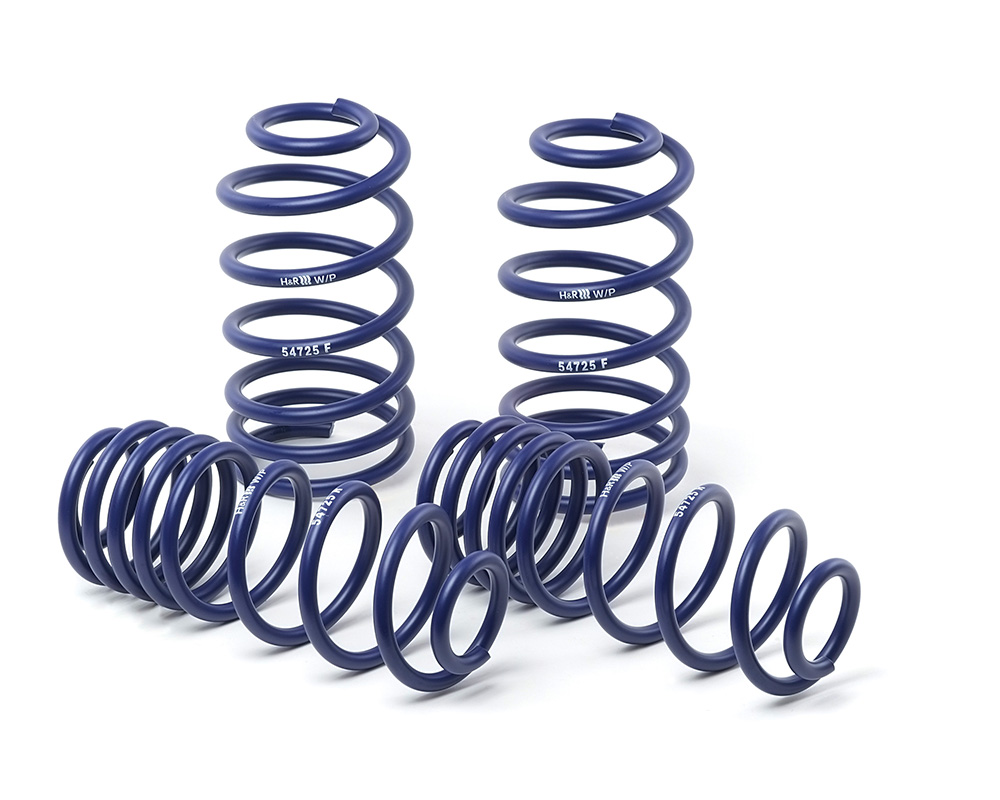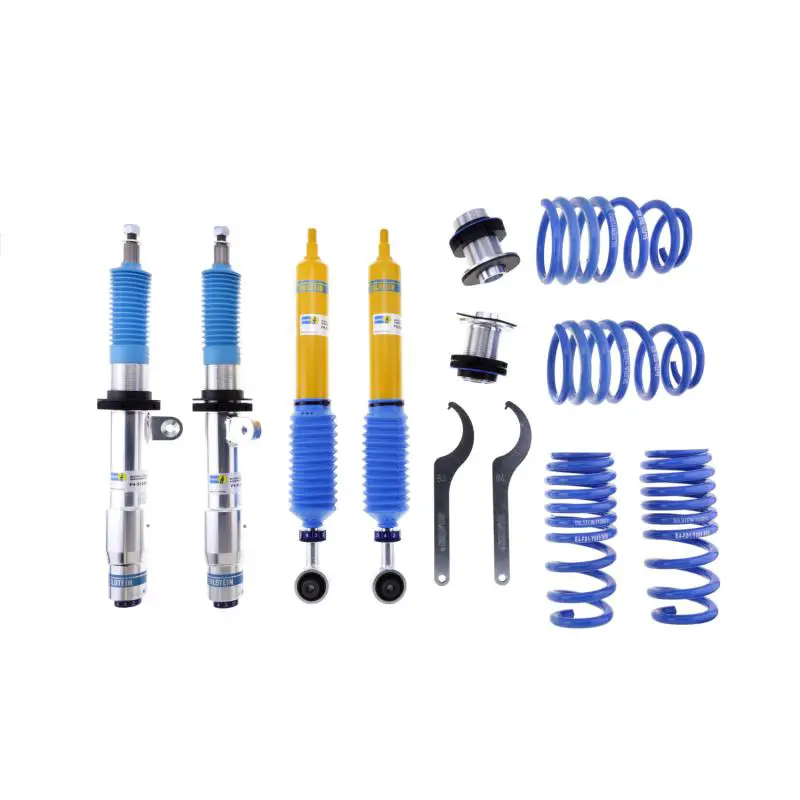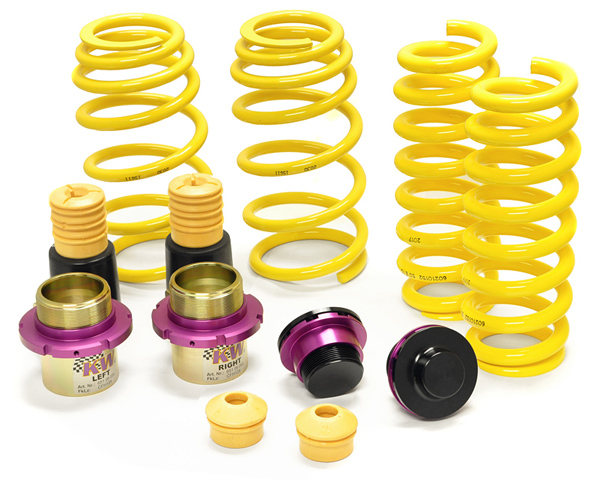Lowering Springs Vs. Coilovers Vs. Coilover Sleeves
Which one is right for you?
Low and slow or fast and gassed?
When you first entered the world of car modding, were you just taken aback by the sheer volume of possibilities? To glance at any forum, YouTube channel or other sharing platform, it just becomes a frenzy of recommendations and ideas.
Before you dive into the alphabet salad of advanced mods, you might start with something a bit easier to understand — like your suspension. One of the most popular paths people go down is lowering their car.

What are your options?
Broadly speaking, you can choose the following three options when it comes to lowering your car closer to the ground:
- Lowering springs
- Coilovers
- Coilover sleeves
In today’s piece, we’ll be looking at each of these and the pros and cons that come with each choice. If you’re new to car modding, then some of these components may just look like carbon copies of each other, but there are some pretty big differences to take into account.

1. Lowering Springs
These are the go-to for many, especially given their lower overall cost. These springs come in a range of styles and forms — e.g. linear springs, progressive springs etc. — and are a simple solution allowing you to lower your car cheaply.
Pros:
- Precision-made by top manufacturers to suit various car models and manufactured to an extremely high standard with superb brands to choose from.
- Get huge improvements to overall look and performance of your car for as little as $300-500.
- Ride benefits are useful for track use and even everyday road use – handling in particular is boosted.
- Installation is fairly simple. They fit right onto a typical OEM strut with a spring compressor. It’s not exactly DIY, but isn’t typically a lengthy or costly job.
Cons:
- High in quality though they are, there is no adjustability, unlike coilovers. When you install coilovers you get much greater scope to adjust and tailor the system to your exact needs (see more below). Springs come as a “done deal” from the manufacturers.
- More suitable for newer cars with struts that aren’t yet worn out. Owners of older cars whose struts are more worn may want to consider coilovers because you’ll have to replace the strut if you want to put in the springs (more below).
- Ride improvement does come with lowering springs, but its scope is really limited. Those looking for higher degrees of enhancement should look for more adjustability.

2. Coilovers
If you’re not familiar with this nomenclature, the name coilover comes from the composition of this part — a coil spring over a strut or a shock. If lowering springs are a simple first foray into modding the suspension, then the coilover is the more advanced next step.
Pros:
- The top advantage of a coilover is adjustability. Unlike lowering springs, coilovers don’t come with a pre-set spring rate from the manufacturers. It’s fully customizable, allowing you to change the ride height, spring rates, and dampening level.
- Adjustability makes coilovers the superior choice for those who need a more tailored and precise alteration to suit their needs. Off-the-shelf products like lowering springs cater to a group that has no specific need, but just wants a lowered car. Coilovers allow track users and road users to adjust with precision.
- This means that coilovers will deliver the biggest margin of drive performance increase. You can essentially have as much or as little of an increase as you want or need.
- Great for older cars with more worn struts. If you’re going to have to replace the struts anyway, you may as well go for a coilover option instead of just limiting yourself to lowering springs.
Cons:
- To go cheap, you may have to resort to platforms like eBay where you’re only getting knock-offs or generic imitations.
- To go genuine with quality guarantees, you’ll have to budget more heavily — up to $2500-3000 for big brands like Fortune Auto — which makes these less accessible.

3. Coilover Sleeves
The sleeve path presents a sort of happy medium between ‘springs only’ and the costlier ‘coilover’ route. Coilover sleeves are essentially a collar with spring; more than the lowering springs alone, but less gear than in the full coilover kit.
Pros:
- Generally speaking, the sleeves are far more affordable than coilovers (around $800)
- If you pair these with decent shocks, you can come up with a great budget coilover-style system with some adjustability.
- You’ll get more adjustability than if using lowering springs alone.
Cons:
- Overall, the cons for the coilover sleeves are similar to that of the lowering springs, but to a smaller degree.
- Your scale of adjustability is reduced, and you do have to be vigilant for knock-off products or inferior products being sold at rock-bottom rates.
The Verdict? You Get What You Pay For!
In the end, perhaps pitting these three options against each other like we do above isn’t the fairest method of looking at them. The truth is that all of them can serve you well depending on your needs and your budget. In the end, the final quality you get and level of enhancement you achieve comes down to how much you’re willing to shell out and how much time you’re willing to put in.

Popular Blogs
Don’t see the topic you’re looking for? We are still growing out knowledge base, let us know what you want to learn about!
Can BMW Charge at Tesla?
Can BMW Charge at Tesla? As of now, BMWs can't directly charge at Tesla Supercharger stations because Tesla uses a proprietary connector. However, with the right third-party adapter, BMW owners might be able to make it work, but it's always good to double-check...
Are BMW Motorcycles Reliable? A Comprehensive Dive into the World of BMW Bikes
Are BMW Motorcycles Reliable? BMW motorcycles are renowned for their top-notch engineering and build quality, making them a reliable choice for riders around the world. Whether you're hitting the open road or tackling rugged terrains, you can count on a BMW to be a...
Can BMW Take 87 Gas? Discover the Truth Behind the Octane Debate!
Can BMW Take 87 Gas? Certainly! While a BMW can technically run on 87 octane gas, it's not the optimal choice. BMW recommends using premium fuel for most of their models to ensure the best performance and longevity of the engine. So, while it might be tempting to...
Embrace the Future with the BMW Genius Program
You know, they often say that 'knowledge is power'. Well, that's never been truer than in the case of BMW's groundbreaking initiative - The BMW Genius Program. Tailor-made for every BMW enthusiast out there, this program sheds light on the latest technological...
A Comprehensive Dive into the BMW N63: A Blend of Power, Performance, and Precision
Hey there, gearheads! Welcome to a deep dive into the fascinating world of one of the most renowned engines out there: the BMW N63. We're about to embark on an exciting journey, exploring the good, the bad, and the powerful of this engineering marvel. Are you ready...
How BMW TPMS Works: A Comprehensive Guide
When it comes to innovation and performance, BMW never falls short. But how well do you know the intricacies of your vehicle, specifically the Tire Pressure Monitoring System (TPMS)? Let's take a journey to understand how BMW TPMS works. How BMW TPMS Works So,...
Can BMW Keys Be Reprogrammed? Your Comprehensive Guide
Ah, the wonders of technology! It's in everything these days, from the appliances in our homes to the phones in our hands. And of course, it's a big part of our beloved vehicles too, particularly in prestigious brands like BMW. One feature that often leaves car...
How BMW VANOS Works: A Comprehensive Guide to Variable Valve Timing
Introduction Welcome to our comprehensive guide on the fascinating topic of how BMW VANOS works. If you've ever wondered about the inner workings of your BMW engine and how it achieves optimal performance, you're in the right place. In this article, we'll take a...
How BMW Models Work – BMW Model Names Explained
BMW, or Bayerische Motoren Werke, a name synonymous with luxury, performance, and automotive engineering, often leaves many of us scratching our heads when it comes to deciphering their model naming conventions. Do you ever wonder what these series of letters and...
Will BMW Wheels Fit Mercedes? Exploring the Compatibility Between Two Iconic Brands
When it comes to automobiles, BMW and Mercedes-Benz are two of the most renowned and prestigious brands in the world. Both manufacturers have established themselves as leaders in the industry, producing vehicles that exude luxury, performance, and style. However,...
